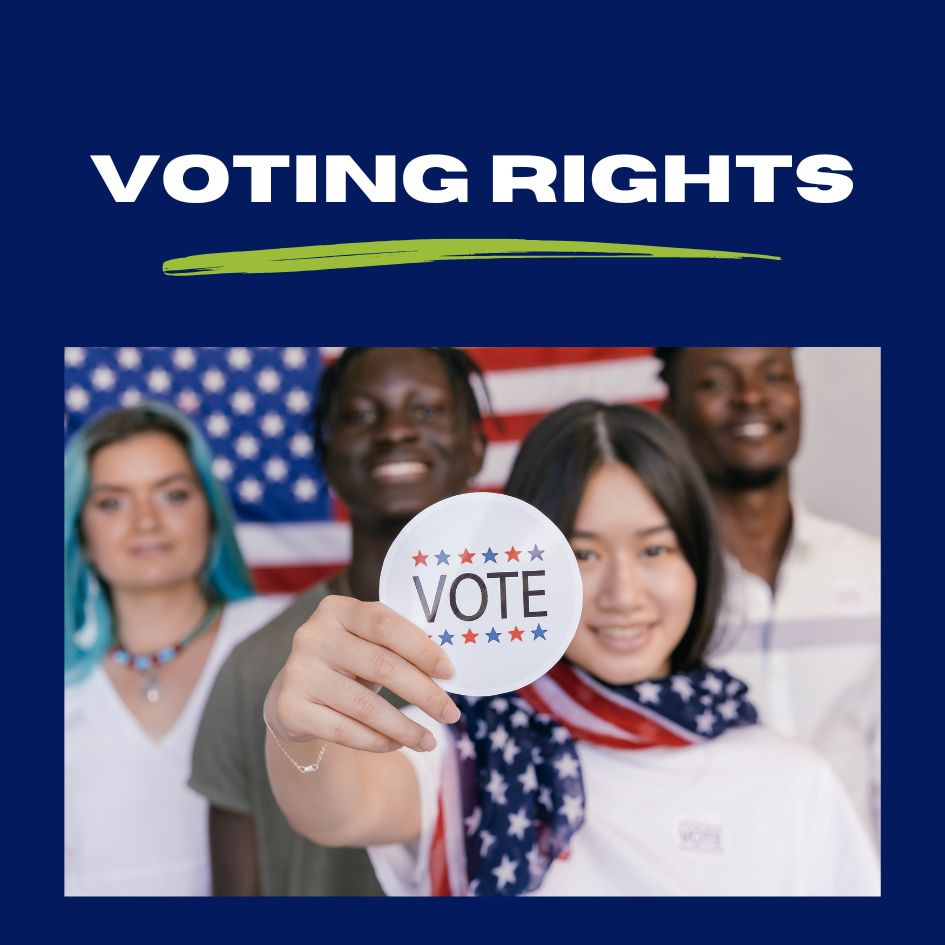
NCJW Dallas stands firmly in support of policies that make voting accessible to all eligible Texans, and we oppose any attempts to suppress or restrict voter participation. We believe that a healthy democracy depends on the active participation of all citizens, and we are committed to advocating for policies that uphold the integrity and fairness of our electoral system.
Because full representation matters, we support a number of bills that enhance voting accessibility and equity. Furthermore, we strongly oppose any legislation that seeks to suppress voting or restrict voter access. We oppose bills that require proof of citizenship to register to vote, and we oppose any bill that creates unnecessary administrative burdens for voters or election officials.
WHY VOTING RIGHTS MATTER
⏹️ FULL ENFRANCHISEMENT IS VITAL
We believe that every eligible citizen in Texas should have the right to register, cast a ballot, and know that their vote will be counted accurately. This is fundamental to the strength of our democracy.
⏹️ OUR DEMOCRACY THRIVES WHEN ALL VOICES ARE HEARD
Texas’ voting system has served its residents well for many years. Introducing unnecessary obstacles that disenfranchise voters undermines the integrity of our democracy.
⏹️ SAFEGUARDS ARE NECESSARY, BUT NOT AT THE EXPENSE OF VOTER SUPPRESSION
While protecting against illegal voting is important, the current system in Texas has not been corrupted by voter fraud, and additional, burdensome safeguards are often counterproductive. They restrict access to voting without addressing real issues.
POSITIONS ON THE 89TH LEGISLATIVE SESSION
✅WE SUPPORT
We support a number of bills that enhance voting accessibility and equity, including:
- HB 2082 (Bucy): An omnibus bill that restores voting rights to individuals convicted of a felony, establishes same-day and automatic voter registration, broadens access to mail-in voting, and revises voter ID requirements.
- Online voter registration (HB 611, HB 2394, HB 2619, HB 3247, and SB 258): 42 states already allow online voter registration. Texas should follow suit to make the process easier and more accessible.
- Voting by mail for certain pregnant women (SB 1072 – Eckhardt): This bill ensures that pregnant women who face health risks during their pregnancies can vote by mail, allowing them to participate without undue hardship.
- Allowing 17-year-olds to vote in primary elections (SB 68 – Zaffirini; SB 630 – Eckhardt; HJR 122 – Howard / SJR 9 – Zaffirini; SJR 29 – Eckhardt): This would empower young voters to engage in the political process earlier.
- Protecting election officials (SB 891 – Johnson): This bill ensures that election officials are safeguarded from harassment and undue pressure as they carry out their duties.
- Protecting transgender voting rights (HB 545 – Meza and HB 894 – Reynolds): We support bills that protect the rights of transgender individuals to vote and be treated with dignity in the voting process.
Additional Pro-Voting Bills:
- HB 146, HB 417, HB 425, HB 429, HB 522, HB 590, HB 614, HB 628, HB 1218, HB 1296, HB 1780, HB 1856, HB 2074, HB 2139, HB 3028, SB 62, SB 146, SB 892, SB 977, SB 979 – all of these bills address voting rights and seek to enhance voter participation.
⛔ WE OPPOSE
We strongly oppose any legislation that seeks to suppress voting or restrict voter access. This includes bills that:
- Limit voter registration or voting access: For example, bills that shorten early voting periods, eliminate countywide voting, or purge voter rolls unnecessarily undermine the right to vote.
- Would create unnecessary barriers to voting: HB 1013 (Toth): An omnibus bill that restricts eligibility for mail voting, shortens early voting, increases criminal penalties related to voting, and eliminates the use of electronic voting systems.
- Prevent county-wide voting (HB 2990, HB 3361, and SB 76): Countywide voting is a convenient and widely popular option for eligible voters. Limiting it would unnecessarily reduce access to the polls.
- Cancel voter registrations for minor reasons (SB 396, HB 2272): Bills that cancel voter registration for not voting in the past two years or for using a PO Box as an address unfairly disenfranchise voters.
- Restrict mail-in ballots (HB 1091): This bill reduces the time for mail ballots to be mailed in and counted, which could result in valid votes being discarded.
- Political party affiliation requirements (HB 951 and HB 934): Requiring voters to register their party affiliation to vote in primary elections unnecessarily restricts access to voting.
- Limit voter assistance (HB 521): We oppose any bill that limits the ability of voters to receive assistance in casting their ballots, as it is an essential part of ensuring access for all.
- Limit voter registration outreach (HB 1489 and SB 511): Bills that limit the ability of state and political subdivision employees to distribute voter registration forms would reduce access to voting and discourage civic participation.
Opposition to Proof of Citizenship Bills:
- HJR 49, HB 219, HB 304, HB 892, HB 1263, HB 1312, HB 1670, HB 1802, SB 309: These bills are unnecessary and would create significant barriers for eligible voters, especially those who face difficulties accessing the required documentation.
Opposition to Unnecessary Burdens on Voters and Election Administrators:
- Limiting schools as polling places (HB 2579 and SB 567): Schools provide an essential and accessible location for voting, particularly in communities with limited access to other polling locations.
Our support for pro-voting legislation and our opposition to voter suppression measures are guided by our core belief that our vote is our voice—and that every voice deserves to be heard. By working together to safeguard and expand voting rights, we can ensure that our democracy remains strong, inclusive, and representative of all people.
